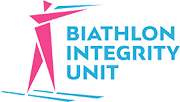Anti-Doping
RIGHTS AnD RESPONSIBILITIES
of Athletes, Athlete Support Personnel and other groups under the World Anti-Doping Code
Athletes’ responsibilities include:
- To be knowledgeable of and comply with all applicable anti-doping policies and rules adopted under the Code
- To be available for sample collection at all times
- To take responsibility, in the context of anti-doping, for what they ingest and use
- To inform medical personnel of their obligation not to use prohibited substances and prohibited methods and to take responsibility to make sure that any medical treatment received does not violate anti-doping policies and rules adopted under the Code
- To disclose to their National Anti-Doping Organization and the IBU any decision by a non-Code Signatory finding that the Athlete committed an anti-doping rule violation within the previous 10 years
- To cooperate with Anti-Doping Organizations investigating Anti-Doping Rule Violations
- To disclose the identity of their Athlete support personnel upon request by any Anti-Doping Organization with authority over the Athlete.
Athletes’ rights are clearly set out in WADA’s Athletes’ Anti-Doping Rights Act
Responsibilities of Athlete Support Personnel include:
- To be knowledgeable of and comply with all anti-doping policies and rules adopted under the Code and which are applicable to them or the Athletes whom they support
- To cooperate with the Athlete testing program
- To use their influence on Athlete values and behaviour to foster anti-doping attitudes
- To disclose to their National Anti-Doping Organization and the IBU any decision by a non-Code Signatory finding that they committed an anti-doping rule violation within the previous 10 years
- To cooperate with Anti-Doping Organizations investigating Anti-Doping Rule Violations
- Athlete support personnel must not use or possess any prohibited substance or prohibited method without valid justification.
THE PRINCIPLE OF STRICT LIABILITY
Strict liability means that you are strictly liable for the substance found in your bodily specimen, and that an ADRV occurs whenever a prohibited substance (or its metabolites or markers) is found in your bodily specimen, whether or not you intentionally or unintentionally used a prohibited substance or were negligent or otherwise at fault.
However, the strict liability rule for the finding of a prohibited substance in your specimen allows for the possibility that sanctions may be modified based on specific criteria, as consistently stated by the Court of Arbitration for Sport (CAS).
The rule seeks to provide a reasonable balance between, on one hand, effective anti-doping enforcement for the benefit of clean Athletes and, on the other hand, fairness in the exceptional circumstances where a prohibited substance entered an Athlete’s system through no fault or negligence on the Athlete’s part.

